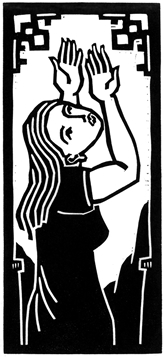 Have you ever read Psalm 88? I would encourage you to read it. First, a word of caution: don’t read it as the last thing you do before you go to bed tonight. Don’t read it when you’re all alone. Or on a cloudy day. Try to read it in brightly-lit room full of your closest friends. Because Psalm 88 is a downer. It’s tough.
Have you ever read Psalm 88? I would encourage you to read it. First, a word of caution: don’t read it as the last thing you do before you go to bed tonight. Don’t read it when you’re all alone. Or on a cloudy day. Try to read it in brightly-lit room full of your closest friends. Because Psalm 88 is a downer. It’s tough.
“My soul is full of trouble and my life draws near the grave.
I am set apart with the dead, like the slain who lie in the grave,
whom you remember no more, who are cut off from your care.”
Of the 150 Psalms, nearly half of them are labeled as lament psalms. Lamentations. Anger. Doubt. Bitterness. Confusion. Questions. Complaints against God. Even accusations against God. And Psalm 88 may be the most uncomfortable.
“You have put me in the lowest pit…”
“You have overwhelmed me with all your waves…”
“You have taken from me my closest friends…”
Psalm 88 is the only lament psalm that doesn’t, at some point, turn to praise. There’s no praise here. No thanksgiving. There’s not even any hope that God will eventually change his mind or eventually rescue. The psalmist here declares that praying to God is doing no good. God has abandoned him completely. And there’s no light at the end of the tunnel.
“Why, O Lord, do you reject me?”
“Your terrors have destroyed me.”
“The darkness is my closest friend.”
Maybe you’ve never read Psalm 88. But have you ever felt Psalm 88?
This past Sunday here at Legacy we read Psalm 88 and then we prayed it. We lifted up to God our despair and depression, our confusions and doubts. We lifted up to God all those in our congregation suffering from cancer and other disease, those dealing with divorce, those struggling with unemployment, those battling family issues such as rebellious children and abusive spouses, our people who are suffering through the loss of loved ones — both recent and a long time ago. On Sunday we were honest with our God about our faith and our fears. We asked him the hard questions. Why are these things happening? How long will they continue? We told God plainly that we don’t always understand.
Those aren’t easy words to pray. It’s unusual in that we rarely pray this way at all, especially in a corporate Sunday morning setting. But the reading and the prayer and the open and honest theme of the day seemed to be especially meaningful to the many, many, many, many people of our church who are feeling Psalm 88.
It would be impossible to share with you in this space the more-than-usual number of phone calls, emails, and pop-in visits I’ve received in just the two days since Sunday’s service regarding what we did together as a church family. Being publicly and completely honest with God and with ourselves about our pains — physical, emotional, and spiritual pains — resonated with young and old, men and women, from every background and worldview imaginable. It touched people. It bonded people. Because a whole lot of us are feeling Psalm 88. At some point, most of us have felt Psalm 88.
Some still balk at using this kind of language with God, even though all of God’s people in Scripture, from the Patriarchs and Judges and Prophets to Christ himself and the Saints in heaven, have used the language of lament to voice their complaints to God in the middle of great trial. But there’s great comfort in unburdening yourself. There’s great relief in unloading and getting things off your chest. There’s solace in knowing that he’s listening.
You know that.
It’s OK. God loves you, remember?
Peace,
Allan
And then read 89.